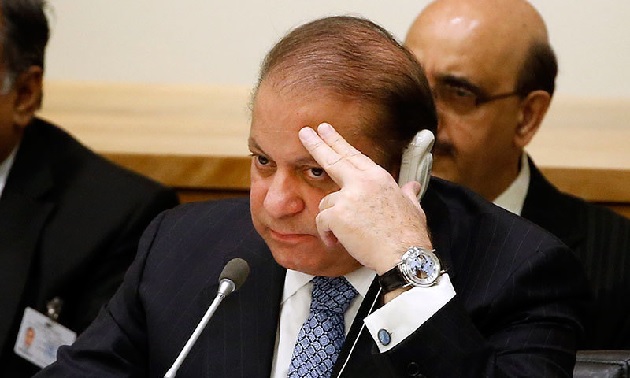By Ahmed Rashid
As though it were a giant spider, the Panama Papers leak has another victim caught in its web. Iceland’s Sigmundur David Gunnlaugsson stepped aside as prime minister amid the fallout from the revelations and now Nawaz Sharif is struggling as he and his family have been enmeshed by the allegations.
For the third time in the past few weeks, Pakistan’s prime minister has addressed the nation to try to explain why his two sons and daughter have offshore accounts. On Monday, on live television he laid out to parliament with a vengeful alliance of opposition parties and the army waiting in the wings how his family had acquired its allegedly enormous wealth and how his sons, who are in the property business in London, had the funds to buy flats in up market Mayfair.
The opposition was having none of it and walked out of parliament, saying it had asked Mr. Sharif to answer seven questions, of which he had answered none but had raised another 70 about the sources of the wealth.
The army has been putting pressure on Mr. Sharif to clear up the Panama Papers mess quickly because governance has been paralysed. The prime minister has offered the opposition a Supreme Court judicial commission to investigate the allegations, but for weeks there has been no progress as the government and the opposition have been unable to agree on the terms of reference.
One reason for this may be that the opposition is just as implicated by the leaks as government leaders. More than 300 Pakistani businessmen, politicians, landlords and others have now been named by the Consortium of Investigative Journalists, which revealed the papers, as having offshore accounts. Although there is nothing illegal about having such accounts, the unanswered questions for Pakistanis are: where did the wealth come from and was it taxed before it left the country?
The latest release from the papers named cricketer-turned-politician Imran Khan, who has led the opposition in demanding Mr Sharif’s resignation, as having used an offshore account, along with other prominent members of his party.
Since the leaks were first reported, the antagonism between Mr. Sharif and army chief General Raheel Sharif (no relation) has become so acute that the two did not meet for six weeks. After several policy confrontations with the government over the past two years, the army now virtually controls foreign policy, security and law and order.
Thus it was no surprise that on the very day that Mr. Sharif was sweating it out in parliament, Gen Sharif was in Beijing assuring his counterparts there that he would provide sufficient security in his country and its border regions for the promised $45bn of Chinese investment in Pakistan’s infrastructure for President Xi Jinping’s flagship “One Road, One Belt” project to be forthcoming.
Mr Sharif is banking on the funds from China to improve his own credibility with the army and popularity with the public, but it is an open secret that Beijing is building such projects more in geostrategic consultations with the army than with the civilians.
The Chinese and the Americans have both become critical of Pakistan’s failure to fulfil its promise of more than a year ago to persuade the Pakistan-based Afghan Taliban leadership to hold peace talks with the Kabul government and the military situation in Afghanistan is becoming worse as the Taliban notch up successes.
But the Americans are also getting nervous about growing strategic ties between China and Pakistan. A Pentagon report released just a day before Gen Sharif arrived in Beijing said China was looking for naval logistics hubs in countries with which it is friendly, “such as Pakistan”.
The Pakistani naval port of Gwadar, built by the Chinese on the Gulf, has long been rumoured to have been eyed by China for just such a role. However, if Pakistan agreed to that it would further aggravate India; New Delhi has long been at odds with Beijing and would react strongly if its navy had access to a port just a few hundreds miles from the Indian coastline.
Mr. Sharif’s own pet project of opening trade ties with India and inviting investment from the country has been repeatedly scuttled by the army, which seems to be preparing for a ratcheting up of tensions with its accusations that both Afghanistan and Iran have been harbouring Indian spies.
Any geostrategic changes that could help rebuild Pakistan’s crumbling economy and regional political relevance would also go for nothing unless the civilians get a grip on governance, perform better and are less rapacious. Despite these months of scandal the government has issued no anti-corruption measures nor charged anyone with corruption.
If the civilians have to perform better, so must the army share some degree of decision making and power with them. Such issues as whether to improve ties with India or go after the Afghan Taliban keep the army and the politicians divided. Apart from its friendship with China, Pakistan suffers an isolation in the region that it can ill-afford. It needs move past the civil-military animosity to convince its neighbours of its seriousness.
‘Courtesy The Financial Times’.


